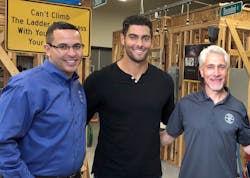How many manufacturing companies do you know whose leadership comes from the third or fourth generation of the founding family? The answer is probably not many. How about six-generation leaders? Well, Klein Tool’s top leadership can trace their history back six generations to when the company opened up shop in 1857.
The photo of the top of this page shows a few generations which include, from left to right, Thomas R. Klein Jr., Thomas R. Klein Sr., Mathias A. Klein III, and Mark P. Klein.
This longevity doesn't happen by chance. The manufacturer of hand tools, which is based in Lincolnshire, Ill and has nine facilities in seven states., has not only honed its leadership but its entire team.
To find out their secrets, IndustryWeek talked to its current president Mark Klein. Mark became president in 2015 after playing a significant role in Klein's six consecutive years of record growth, bringing to market new sales channels such as HVAC.
IW: How has technology changed over the years and what effect is that having on attracting the future workforce?
MK: As a hand-tool manufacturer, we rely heavily on a human touch to ensure the right hand feel for our tools. That has been the same since my great-great-great-grandfather, Mathias Klein, forged the first pair of Klein pliers back in 1857.
What has changed, however, is our ability to use technology to make manufacturing our tools more precise, more consistent and more efficient. For instance, the tolerance, or level of acceptable variation, among one pair of Klein Tools pliers to the next is about the same as the thickness of a sheet of plain paper. And we produce tens of thousands of tools a day to meet that standard.
To make that possible, we have integrated exciting new technologies and processes to engage a younger workforce that is eager to learn computer automation.
We have adopted lean manufacturing techniques that provide better transparency and accountability, while also educating the teams on critical thinking and problem-solving methods.
By continuously adapting our engineering, manufacturing and quality processes to leverage new technology and ideas, we’ve been able to grow our business significantly over the past few decades without sacrificing the quality that professionals have expected from Klein Tools their whole lives.
IW: What skills or characteristics would you attribute to successful employees?
MK:: One of the core values at Klein Tools is ownership. All of us, from the chairman to the interns, feel invested in the work that we do and how that work contributes not only to the company’s long-term goals, but also the skilled trades and worldwide infrastructure.
Successful employees here take pride in being resourceful and wearing a lot of hats. They are comfortable stepping up to perform any task that drives team success because they know that our success means a greater chance of success for our customers. We recognize that some of our competitors have more resources than we do, but we have a team of invested and resourceful employees that allow us to compete successfully in today’s marketplace.
IW: Is on-the-job training one of the resources that contribute to your success?
MK: Yes, on-the-job training is something that employees value highly. In fact, a study we did in 2017, “State of the Industry”: Electricians Doing their Part to Close U.S. Skills Gap,” found that for both union and non- union employees more than 80% of respondents reported on-the-job training as the most valuable part of their educational experience.
We are focused on being closely involved in providing skills that our industry needs. In addition to partnering with local technical schools that provide manufacturing, engineering and computer numerical control (CNC) machining curriculums, in 2017 we increased our investment to two million dollars with the International Brotherhood of Electrical Workers (IBEW), the National Electrical Contractors Association (NECA) and The Electrical Training Alliance to promote comprehensive training.
We are active on a national level as well. In 2019 we were the sponsor of SkillsUSA National Signing Day. We had the opportunity to recognize nearly 3,000 high school seniors from 300 schools across the country for their commitment to the skilled trades. These students will make a big impact on the U.S. labor market and will help to close the skills gap impacting our country today.
Last year NFL Quarterback, Jimmy Garoppolo, and his father, Tony, a recently retired career electrician, made an appearance at the event and were all set to continue their support for this year’s Signing Day which was to have taken place on May 8th but was canceled due to the virus.
To show you how important this event was to Jimmy, the first public statement he has made since the 49ers’ locker-room exit a few days after their Super Bowl loss to Kansas City in February, was to support this year’s Signing Day. In a video, he said: “We just want to send this message to let them know how tremendously proud we are of all of them.”
IW: What are some best practices for retaining talent?
MK: One thing the organizational development team here at Klein Tools has had a lot of success with is to make sure that all employees feel heard.
While pay, benefits and other incentives may do a lot of the up-front legwork of attracting employees, that’s not enough to keep them around for the long term.
We also place a lot of value in making opportunities for employees to learn and grow within the organization. Especially on the front lines of manufacturing, there are ample opportunities for education on different machines/systems and other development as we invest in new technology and streamline processes.
We are a family-run business that strives to feel like a family at every level of the organization. So when our team members have an opinion, a suggestion, or a concern, we listen, just like we would listen to a member of our own family.
About the Author
Adrienne Selko
Sr. Editor
Focus: Workforce, Talent
Email: [email protected]
Follow Me on Twitter: @ASelkoIW
Senior Editor Adrienne Selko has written about many topics over the 17 years she has been with the publication and currently focuses on workforce development strategies. She is also a senior editor at Material Handling & Logistics and EHS Today.
Previously Adrienne was in corporate communications at a medical manufacturing company as well as a large regional bank.
She is the author of Do I Have to Wear Garlic Around My Neck?, which made the Cleveland Plain Dealer's best sellers list.

